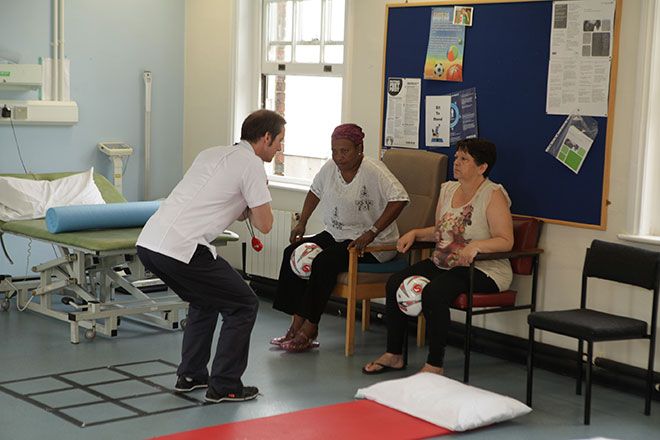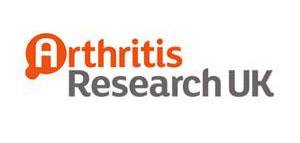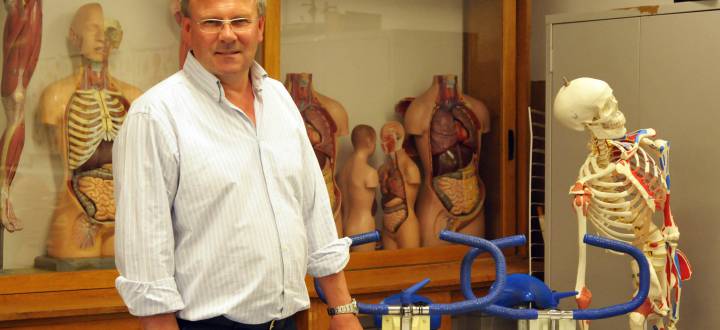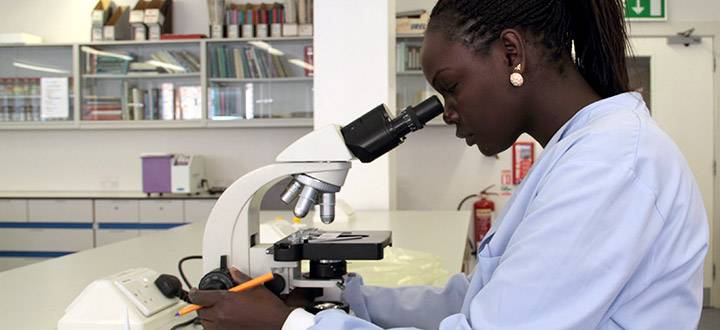Escaping the pain of arthritis
Chronic joint pain and joint stiffness are the main symptoms associated with osteoarthritis – the most common form of arthritis. Although it cannot be cured, there is a great deal of evidence that better understanding of the problem and exercise are very effective ways of reducing pain and the physical and psychosocial effects of chronic pain.
 Professor Mike Hurley, Professor of Rehabilitation Sciences at Kingston University and St George's University of London, has devised a rehabilitation programme for chronic joint pain that is shaping the way arthritic pain is managed.
Professor Mike Hurley, Professor of Rehabilitation Sciences at Kingston University and St George's University of London, has devised a rehabilitation programme for chronic joint pain that is shaping the way arthritic pain is managed.
Musculoskeletal conditions account for the largest proportion of years lived with disability and are a leading cause of work absence. Arthritic pain can devastate the lives of those living with it. 'Enabling Self-management and Coping with Arthritic-Pain' (ESCAPE-pain) is a practical, cost-effective and sustainable intervention that is offering sufferers hope of a better quality of life through a programme of self-education and exercise.
ESCAPE-pain programme
 ESCAPE-pain offers people a six-week programme that combines self-education and coping strategies with individually tailored exercise regimen. It helps people understand their condition, teaches them simple things they can help themselves with, and takes them through a progressive exercise programme so they learn how to cope with pain better.
ESCAPE-pain offers people a six-week programme that combines self-education and coping strategies with individually tailored exercise regimen. It helps people understand their condition, teaches them simple things they can help themselves with, and takes them through a progressive exercise programme so they learn how to cope with pain better.
Robust evaluation and independent review
ESCAPE-pain originated at the Dulwich Community Hospital with a large study that compared the ESCAPE-pain programme with usual GP management. ESCAPE-pain showed greater benefits in function and self-efficacy and these were maintained over time. The study also showed cost benefits to the NHS.
 Sevenoaks Hospital in Kent then piloted a comparison study of ESCAPE-pain versus standard physiotherapy. Both showed improvements in function and self-efficacy, however, the patients in the ESCAPE-pain group showed longer lasting improvements.
Sevenoaks Hospital in Kent then piloted a comparison study of ESCAPE-pain versus standard physiotherapy. Both showed improvements in function and self-efficacy, however, the patients in the ESCAPE-pain group showed longer lasting improvements.
Robust evaluation and independent review show that, for the patient, ESCAPE-pain is safe and produces better clinical outcomes, reduces pain, improves physical function and reduces depression. For participants the programme is a very positive experience, altering their lives by increasing their independence, general well-being and quality of life. View a video which encapsulates the programme's benefits to participants.
The programme is more cost-effective than usual care, may help to delay or avoid surgery, and promotes physical activity thereby reducing the risk of acquiring other conditions related to sedentary lifestyles.
Disseminating the programme
Since 2013 Professor Hurley has worked closely with the Health Academic Network (South London's Academic Health Science Network) as Clinical Director of its musculoskeletal programme to increase the spread and adoption of the ESCAPE-pain programme. It is now running in 20 centres across the UK from the south coast to the North East, the Wirral and Swansea, where the outcomes – reduced pain and improved function – have been replicated.
The programme has progressed and expanded by being delivered in community leisure centres and workplace settings, where again, the benefits are replicated. Delivering the programme outside hard pressed clinical departments will enable many more people to benefit.
In September 2016 a smartphone app will be available so that people who wish can do the programme on their own. The programme has been cited in the United Kingdom National Institute for Health and Care Excellence (NICE) Guidelines for the Management of Osteoarthritis [2008], and adopted as a case study in NICE's Quality, Innovation, Productivity and Prevention (QIPP) programme, that highlight interventions that improve care quality and productivity based on quality improvements, savings, strength of evidence and ease of implementation [2012].
In 2015 ESCAPE-pain won an award from the Royal Society of Public Health, and in 2016 won a Best Practice award from the British Society of Rheumatology.
Funding
Arthritis Research UK funding.
Collaborations


Contact us
- For non-student research enquiries, email the Research Office
- Research contacts
- Graduate Research School contacts
- Business and Enterprise contacts
- How to get to Kingston University
Contact us
- For non-student research enquiries, email the Research Office
- Research contacts
- Graduate Research School contacts
- Business and Enterprise contacts
- How to get to Kingston University


